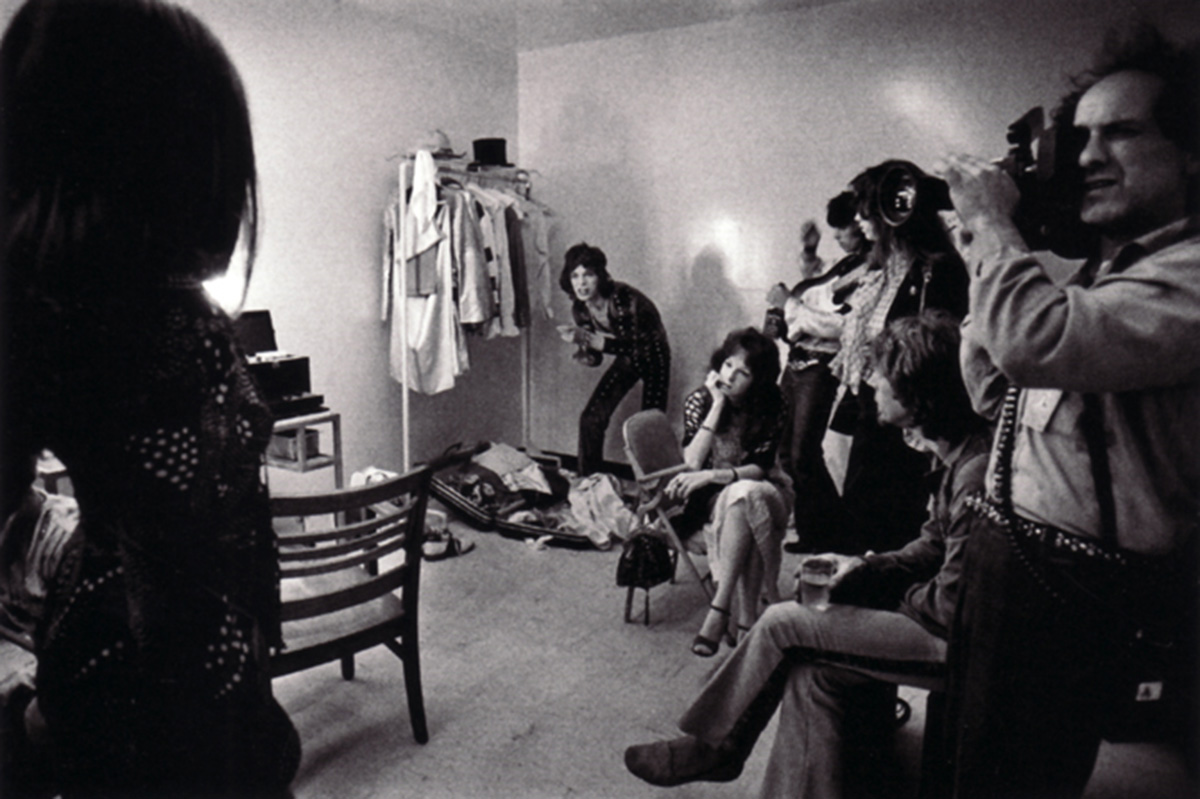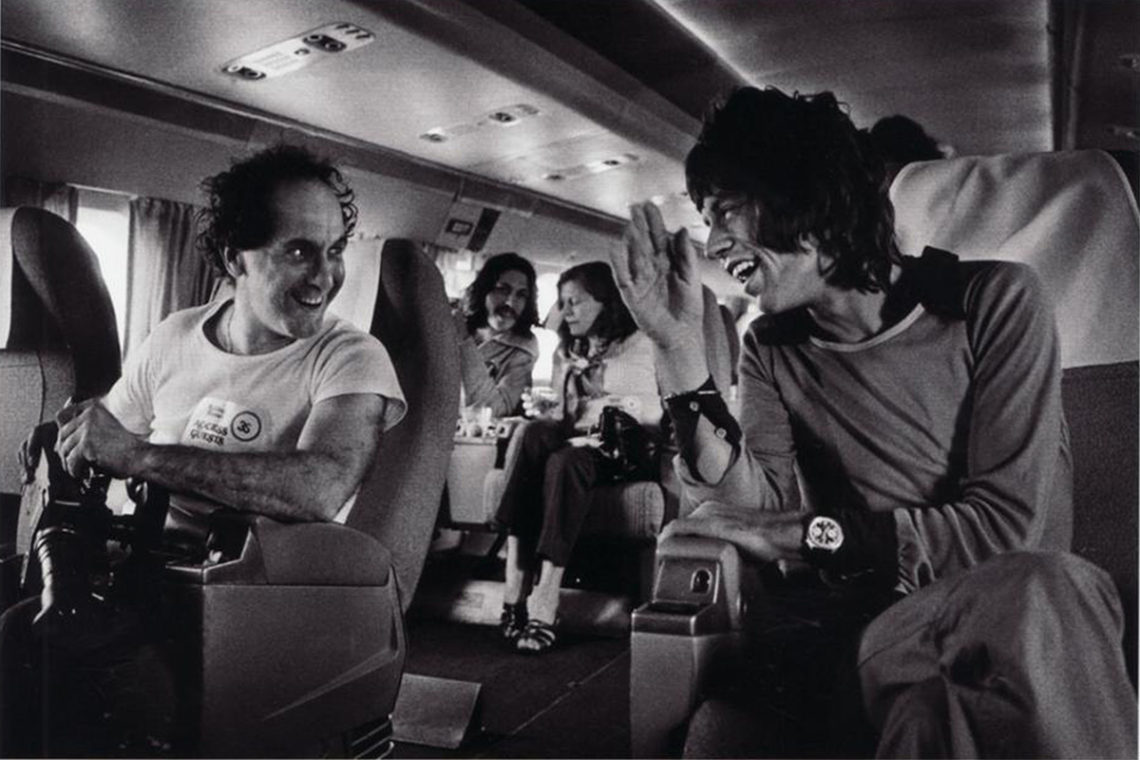Before any of the Rolling Stones stepped one snakeskin-booted foot into an airport terminal, tossed a suitcase into a white cube hotel room, or baked in the antiseptic glow of an endless backstage corridor on their 1972 tour of North America, they were in a different space. Their previous American odyssey in 1969 culminated in the disastrous free concert at the Altamont Speedway in northern California, where four people died, including a young man who was stabbed to death on camera by a member of the Hells Angels. Accusations of responsibility were heavily leveled at the Stones, and even the camera crew, led by David and Albert Maysles, who were hired by the Stones to document the tour (the result being the direct cinema landmark Gimme Shelter [1970]). As a result of Altamont, the Hells Angels, whom the Stones had hired to provide security, and, particularly Sonny Barger, founder of the Oakland chapter, developed a serious vendetta against Stones frontman Mick Jagger, and fears of an assassination attempt on Jagger hung over 1972’s entire tour. The two albums released by the band between their gap in American tours, Sticky Fingers and Exile on Main Street, were recorded in drug-fueled, decadent squalor – with guitarist Keith Richards strung out on a particularly nasty heroin addiction – and the albums reflected this sordid atmosphere. The America to which the Stones were returning was different as well. Attitudes and behaviors that were strictly countercultural, even as late as 1969, had become increasingly mainstream over those intervening years.
It is unclear what Jagger expected when he hired Robert Frank to play the role the Maysles had in 1969. Frank was a veteran of the American road; his journeys across America between 1955 and 1957 produced the photo-essay book The Americans (1958), a landmark achievement of the form that captured the uniquely American isolation of the country and its people. In 1959, Frank eschewed still photography for motion pictures, and mapped out a new path of innovation as a Beat filmmaker with Pull My Daisy (1959) and The Sin of Jesus (1961). Through Frank’s lens, the 1972 tour became Cocksucker Blues (1972), titled after a discarded Jagger/Richards tune. In 1977, it was barred from official release by a court order brought on by the Stones themselves, who believed its frank depiction of drug use and sex in a portrait of boredom, alienation, and tedium of life on the road would prohibit the band from obtaining visas to enter the United States. (Frank and the Stones agreed to an out-of-court settlement that gave Frank ownership of the original film elements on the condition that it not be publicly screened until 1979, and, thereafter, only four times a year – with the additional caveat that Frank must be publicly present at each screening.) In Cocksucker Blues, Frank pushes an onstage, presentational view of the band to the margins, and, instead, brings the margins to center stage. His camera-eye rummages through a succession of anonymous non-places—hotel rooms, backstage dressing rooms, stadium corridors, and airplane cabins —like a sweltering fever dream. As captured by Frank, these depressive spaces of the road—the generic, transitory, and “in-between” places meant for waiting in—populated by spectral bodies, nondescript objects, and empty surfaces, deadened even more by his raw and numb images, exist in a place outside of happiness.

Little in Cocksucker Blues is familiar or comforting. The film reads like a map of the non-place, that most nebulous and abstract of terrains, that is misdirecting, both consciously—due to its labyrinthine structure, like an ingenious Chinese box continuously folding in on itself—and unintentionally—as a result of video transfers of the original film that circulate digitally as bootlegs suffering from severe generation loss. Frank’s elliptical editing style, too, induces the viewer with a sense of disassociation and rejects all orientational measures and scene-to-scene causality; he even refuses to introduce faces and places, both famous and anonymous. On bootlegs, blacks leak their murky ink everywhere and highlights are significantly blown-out. The effect, however, enhances one’s understanding of the on-screen experience. Bodies emanate a sickly, abstract glow that transforms them into the living dead, and the entire film into a pale, diseased ghost of itself. During an interview at the Stones’ Los Angeles retreat, a journalist asks Richards about his tan: “Uh, I’m just trying to get it back. Last week, we’ve been on the road, and, uh, I’ve sort of faded . . . I’m trying to recapture that glorious moment.”
Perhaps most emblematic of the disorientation and disassociation typified by the age of the non-place are the many sequences of the mobile camera’s nomadic, purposeless movement through backstage corridors and hotel hallways that frequently abandons its social actors. In one sequence, the camera plods down a densely atmospheric, murkily lit hotel hallway that brims with the feeling of 4:00 p.m. and a wasted day. The rows of uniformly shut doors do their best to deny the afternoon sun. At the other end of the hall, a silhouette sits on a plain kitchen chair. In another, the Stones march along a narrow, winding corridor beneath an arena, as if they were a line of shackled convicts shuffling past the gaze of armed guards. A network of pipes that hangs from the high ceiling leads the way out of the endless maze to the stage above. The white cinderblock void buzzes in the naked light of the fluorescents. “What state are we in?” a stoned groupie asks at one point. The corridor is neither here nor there. It is a phantom zone, an “in-between” space to be moved through.

The minotaur that dwells within the labyrinthine structure of Cocksucker Blues is despondency. Turn the knob to any hotel room door and one is liable to step smack into it. That feeling of disassociation is generated just as much by the film’s cinematography and editing as it is by the happenings the camera witnesses. In an anonymous hotel room, a groupie prepares a needle; Danny Seymour, the film’s “junkie soundman,” holds her arm up to help her find a vein. “Why did you film it?” she asks Frank behind the camera, after she has had her fix. “It happened,” is his response. In another sequence, Seymour and Keith Richards await a heroin fix in a hotel room. As an unnamed groupie prepares the needle on the nightstand, the haggard Richards sits on the edge of the bed, wrapped in a dark robe, while Seymour’s skin-and-bones frame is curled up in a chair by the window. Both men hardly seem aware of their surroundings, and the blasé expressions remain, even as the groupie plunges the needle into their arms. The scene then abruptly cuts to a sports arena locker room, where the Stones and their entourage sit, waiting (what for is never made clear). Richards sits, slumped over, with his head in his hands, in obvious physical distress. To his right, a groupie consoles him. On his left, two roadies, oblivious to Richards’ state, casually chat and smoke. We hear the asynchronous sounds of the previous scene – hotel floorboards creak, the needle drops onto the table, and the stoned groupie with the fix slurs through a speech no one pays attention to – but nothing from the locker room, whose happening is carried out in ghostly mime.
Frank’s nomadic camera loses its protagonist and wanders into the adjoining locker room, where Jagger holds court with Atlantic Records founder Ahmet Etregün. When the camera finds Richards again, his body has lost even more life; his head has slipped out of his hands and rests on his forearm. By the time the camera drifts off and returns for a third time, Richards has fallen completely over into the groupie’s lap. The roadies to their left have split. Over this image, Frank replaces the woman with the fix’s monologue with Richards’ stoned ruminations. “The atmosphere . . . is just completely . . . against creativity,” he slurs, as he recounts his advice to a young band in Switzerland. Frank cuts back to the hotel room, where Richards, staring blankly into the void around him, sits in Seymour’s vacated chair. “He was shocked when I told him to starve for a bit,” Richards’ guttural voice intones, as he takes drag on his cigarette. The anonymous woman, meanwhile, has traded in one needle for another – she now mends a piece of clothing.

In this sequence, Frank weaves several layers of audio and visual signifiers into an invisible tapestry, but his hand works so subtly it is difficult to see the seams. In so doing, he creates a complex acoustic labyrinth that plays with and against the dominant conventions of synchronous sound in documentary film. The parallel editing between the two non-places traps Richards in a condition of quantum uncertainty – neither alive nor dead. On top of that, Frank mixes several tracks of crackling, nearly inaudible audio – ambient noise from the hotel room, dialogue pulled from a third, unseen setting, a Keith Richards speech whose referential origins are ambiguous at first, but are later traced to the hotel, and – most crucially – silence. The disconnect between the sound and image adds that hallucinatory, disorienting dimension to Richards’ state – especially when it is occasionally punctuated by the asynchronous sounds of the hotel room.
Even though the social actors of Cocksucker Blues are constantly on the move, through airport terminals, hotel rooms, and backstage dressing rooms, their uniform institutional blandness morphs them into one big, perpetual waiting room that feels like they are not moving anywhere at all. Occasionally, we are given impressions of movement – a casual reference to a well-known Los Angeles road, visuals that signify the American South – but that is all Frank gives. His film is a map that goes out of its way to deliberately disorient the viewer. With Cocksucker Blues, Frank tears down everything he built up in Pull My Daisy, in which the freewheeling, spontaneous sensibility of the Beats subverts a traditional space of domesticity. It is an act of liberation that embodies a generation’s utopian vision of freedom through casual encounters with drugs and sex. “Is time holy?” asks Jack Kerouac’s narration in that particular film. “Empty rooms are holy.”
There are no utopias in Cocksucker Blues – nor does not deal in holy spaces. It is not an empty space, either. But neither is a Chinese box – although the process of opening one is certainly disorienting. Like a Beat poem.

















